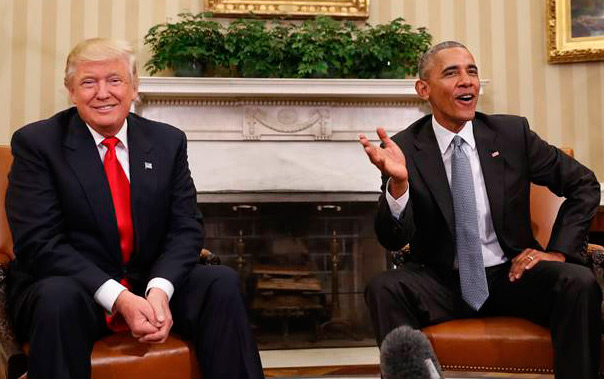Last week we said goodbye to Hilary Clinton; this week we say hello to a new pragmatic politician, Mr. Donald Trump. “Defining all odds and turning all expectations on their head, Donald Trump became the 45th President of the United States of America in a massively divisive campaign that polarised America”, wrote one commentator.
Two days after the election, a humiliated Hilary Clinton said goodbye. Now that the Clintons have finally gone, we are going to miss them. The Clintons have been an extraordinary double act since long before 1992 but now they are, as this same commentator wrote, “just another older couple”.

The word ‘pragmatism’ comes from the Greek word for practical. The Oxford dictionary defines ‘pragmatism’ as “Dealing with things sensibly and realistically in a way that is based on practical rather than theoretical considerations”. So, now we will see Trump, after outsmarting and outfoxing the Clintons, quietly abandon some of the wild promises of the campaign for a more pragmatic or practical way of doing politics.
Relating to immigration, for example, we know that Barack Obama has deported over two and a half million people from the United States during his presidency, but he did it quietly and away from the glare of the media. Trump promised the electorate during his campaign to deport all 11 million undocumented emigrants but now an emerging pragmatic Mr. Trump has diluted this number to between two and three million illegal immigrants who have criminal records, and served time in prison. So it is with many of his other wild remarks.
Over the next weeks Donald Trump will be briefed by the State Department, CIA and Homeland Security on the facts about the risks to security at home and around the globe. Among these issues, he will be briefed on NATO, Vladimir Putin and on Russian foreign policy; especially on Russian intentions in Ukraine, the Crimea and Syria. During the campaign, for example, Trump questioned US membership of NATO with a threat of partially withdrawing. But this won’t happen; his compromise on NATO membership will be, most likely, that everyone, including countries like Spain, will have to pay their full share of NATO costs.

On the economic front, he will certainly lower taxes, especially the corporate tax rate. A lower rate of between 15% and 20% will obviously have strong implications for many foreign governments as well as American companies located in countries such as Ireland. This reduction of US corporate tax rate will strongly push multinationals to repatriate much capital to the US which will help to fund his economic policies and tackle unemployment in the much mentioned ‘rust belt‘ states. Will the public works rebuilding programme of roads, bridges, and other infrastructure be part of his legacy? In managing the US economy, Mr Trump’s administration will put US interests first. That is what he was elected to do.
Studies have shown that American working-class people in general do not resent rich people if they perceive them as hard working and prepared to risk their money. What they don’t like is for the college-educated professional elites to lecture them, either through the media or from their cushy posts in Washington, on what they ought to do or think. This was Mrs. Clinton’s mistake; she didn’t even visit Wisconsin, and Donald Trump capitalised on it.

